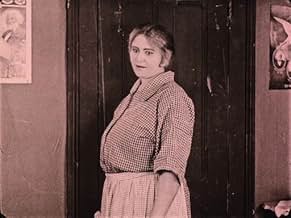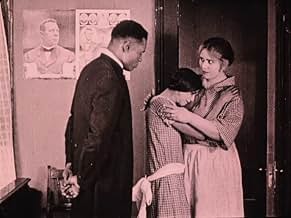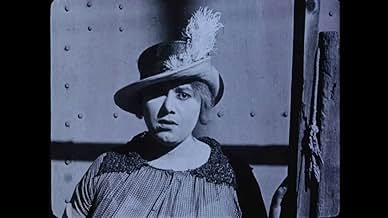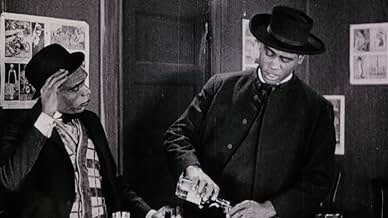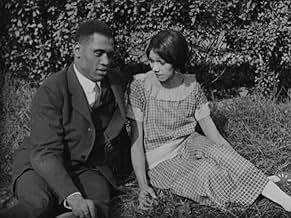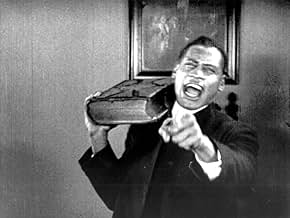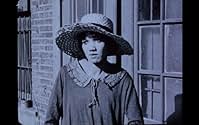NOTE IMDb
6,2/10
1,3 k
MA NOTE
Ajouter une intrigue dans votre langueA malevolent phony preacher plots to take advantage of a woman from his congregation who happens to be in love with his long-estranged identical twin brother.A malevolent phony preacher plots to take advantage of a woman from his congregation who happens to be in love with his long-estranged identical twin brother.A malevolent phony preacher plots to take advantage of a woman from his congregation who happens to be in love with his long-estranged identical twin brother.
- Réalisation
- Scénario
- Casting principal
- Récompenses
- 1 victoire au total
Marshall Rogers
- Speakeasy Proprietor
- (as Marshall Rodgers)
Mercedes Gilbert
- Martha Jane - Her Mother
- (non crédité)
Julia Theresa Russell
- Isabelle - the Girl
- (non crédité)
Avis à la une
A melodrama involving a con man who (somehow) has assumed the role of a preacher (Paul Robeson), and along with an ex-cellmate, sets out to bilk the townspeople out of their money. He's also got his eye on a young woman (Julia Theresa Russell) who just so happens to prefer his kinder twin brother. Robeson turns in a reasonably strong performance in the dual role, even if the character of his twin is somewhat ridiculous. Russell is reasonably good too, and the rape scene told in flashback evokes horror and is well done, probably the film's best.
Overall the film suffers from a weak script, complete with an enormous "it was just a dream" cliché. Accounts vary as to whether the unsatisfying conclusion was due to the considerable problems Micheaux had getting it approved, which unfortunately resulted in a significant hack job. As it is though, it suffers from sloppy editing, has dangling plot points (like the ex-cellmate), and drags on for longer than it should have.
Looking at the film through the lens of today can also be troubling, because the dialogue the characters use is what we think of as stereotypical. As with other films from Micheaux, he unapologetically criticizes the African-American community. Later he would say this:
"I have always tried to make my photoplays present the truth, to lay before the Race a cross-section of its own life, to view the colored heart from close range. My results might have been narrow at times, due perhaps to certain limited situations which I endeavored to portray, but in those limited situations the Truth was the predominant characteristic. It is only by presenting those portions of the Race portrayed in my pictures in the light and background of their true state that we can raise our people to greater heights. I am too much imbued with the spirit of Booker T. Washington to ingraft false virtues upon ourselves, to make ourselves that which we are not. Nothing could be a greater blow to our own progress. The recognition of our true situation will react in itself as a stimulus for self-advancement."
Thus, we have this dialogue, and we have the church congregation falling for the lengthy sermons of a low-life who drinks alcohol out of what looks like a water glass while preaching. Micheaux and other black leaders like W.E.B. DuBois saw religion critically, and as something holding back African-American progress. That's something we also see in the film 'Within Our Gates.' The portrait of ignorance is not flattering, and some black filmgoers were not amused. One at the time likened it to D.W. Griffith's 'Birth of a Nation,' saying "One would expect a white screenwriter to fan the flames of hatred. But what can we say when a black man portrays our people in the same manner?" The white censors were also displeased, seeing in the evil traits of a minister, even a false one, as "sacrilegious, immoral, and would tend to incite to crime."
There is thus a brave honesty here, at least until that ending sequence, and for that I admire Micheaux. He also shows the vulnerability of women in the rape (although it's not the case that she's not believed - in fact it's the opposite, her mother and the congregation believe her and attack the culprit). While rough around the edges, there's a certain power in being a film from a legendary African-American director and featuring the debut of a star, Robeson, who was incredibly multi-faceted and should be better known. Both have done better work, but I'm glad I saw this one, and it's worth checking out.
Overall the film suffers from a weak script, complete with an enormous "it was just a dream" cliché. Accounts vary as to whether the unsatisfying conclusion was due to the considerable problems Micheaux had getting it approved, which unfortunately resulted in a significant hack job. As it is though, it suffers from sloppy editing, has dangling plot points (like the ex-cellmate), and drags on for longer than it should have.
Looking at the film through the lens of today can also be troubling, because the dialogue the characters use is what we think of as stereotypical. As with other films from Micheaux, he unapologetically criticizes the African-American community. Later he would say this:
"I have always tried to make my photoplays present the truth, to lay before the Race a cross-section of its own life, to view the colored heart from close range. My results might have been narrow at times, due perhaps to certain limited situations which I endeavored to portray, but in those limited situations the Truth was the predominant characteristic. It is only by presenting those portions of the Race portrayed in my pictures in the light and background of their true state that we can raise our people to greater heights. I am too much imbued with the spirit of Booker T. Washington to ingraft false virtues upon ourselves, to make ourselves that which we are not. Nothing could be a greater blow to our own progress. The recognition of our true situation will react in itself as a stimulus for self-advancement."
Thus, we have this dialogue, and we have the church congregation falling for the lengthy sermons of a low-life who drinks alcohol out of what looks like a water glass while preaching. Micheaux and other black leaders like W.E.B. DuBois saw religion critically, and as something holding back African-American progress. That's something we also see in the film 'Within Our Gates.' The portrait of ignorance is not flattering, and some black filmgoers were not amused. One at the time likened it to D.W. Griffith's 'Birth of a Nation,' saying "One would expect a white screenwriter to fan the flames of hatred. But what can we say when a black man portrays our people in the same manner?" The white censors were also displeased, seeing in the evil traits of a minister, even a false one, as "sacrilegious, immoral, and would tend to incite to crime."
There is thus a brave honesty here, at least until that ending sequence, and for that I admire Micheaux. He also shows the vulnerability of women in the rape (although it's not the case that she's not believed - in fact it's the opposite, her mother and the congregation believe her and attack the culprit). While rough around the edges, there's a certain power in being a film from a legendary African-American director and featuring the debut of a star, Robeson, who was incredibly multi-faceted and should be better known. Both have done better work, but I'm glad I saw this one, and it's worth checking out.
Body and Soul (1925)
*** (out of 4)
Paul Robeson plays a really sinister con man who will dip to any level to get what he wants. He pretends to be a Reverend and soon he sets his eyes on the good girl Isabelle (Mercedes Gilbert). At first her and her mother just see him as a kind-hearted preacher but soon the daughter realizes his evil ways include trying to steal her life savings.
Director Oscar Micheaux had already made several movies but there's no question that this here was going to be his epic. Robeson was already well-known on the stage so the two of them teaming up seemed like a grand idea but apparently the two men fought for most of the shooting time and apparently they hated each other so much that Robeson wouldn't even discuss this film. It's also said that the original version was much darker but the director was forced to cut it down by several reels, which is really too bad.
As it stands, BODY AND SOUL is a very impressive movie and it's really shocking at how well it turned out and especially when you consider that the budget was very low and of course there was the behind-the-scenes issues. There's no question that the greatest thing about the picture is the performance by Robeson who really does do a terrific job at coming off as this holy man. He certainly makes you believe this fake side of his character and it's easy to see why someone would fall for him. The actor also perfectly nails the more sinister side of the character.
The film looks very good, again, for its budget and the editing is also good. The entire movie looks very professional, which wasn't always the case for these early race movies. I'd also argue that the story itself was quite good and it really wasn't too often that you'd see any movie taking a look at religious figures in a negative way. BODY AND SOUL is certainly another winning film from the director and a great start for Robeson.
*** (out of 4)
Paul Robeson plays a really sinister con man who will dip to any level to get what he wants. He pretends to be a Reverend and soon he sets his eyes on the good girl Isabelle (Mercedes Gilbert). At first her and her mother just see him as a kind-hearted preacher but soon the daughter realizes his evil ways include trying to steal her life savings.
Director Oscar Micheaux had already made several movies but there's no question that this here was going to be his epic. Robeson was already well-known on the stage so the two of them teaming up seemed like a grand idea but apparently the two men fought for most of the shooting time and apparently they hated each other so much that Robeson wouldn't even discuss this film. It's also said that the original version was much darker but the director was forced to cut it down by several reels, which is really too bad.
As it stands, BODY AND SOUL is a very impressive movie and it's really shocking at how well it turned out and especially when you consider that the budget was very low and of course there was the behind-the-scenes issues. There's no question that the greatest thing about the picture is the performance by Robeson who really does do a terrific job at coming off as this holy man. He certainly makes you believe this fake side of his character and it's easy to see why someone would fall for him. The actor also perfectly nails the more sinister side of the character.
The film looks very good, again, for its budget and the editing is also good. The entire movie looks very professional, which wasn't always the case for these early race movies. I'd also argue that the story itself was quite good and it really wasn't too often that you'd see any movie taking a look at religious figures in a negative way. BODY AND SOUL is certainly another winning film from the director and a great start for Robeson.
A very moving film for its time.I'm a big Paul Robeson fan and I'm glad TCM shows a lot of films with all Black casts.I think it should be shown along with the 1929 film "Hallelujah".It also has an all Black cast and has religion as its theme but it's not a silent film.This film ran a little too long but I never stopped watching.Touchy subject matter even today.Right on point even today!Even though Robeson found fame who knows what talent the others had that skin color stopped from them also becoming well known.That's why I love these films.The Black Church must have shunned this type of film back them and the actors couldn't have had an easy time of it.I'd call this a silent soap opera.The mother really loved her daughter a whole lot.Mercy!The daughter was the ultimate tragic figure.The Minister.One word-Sinister!
Its nice to see there was a Black director (Micheaux) with the gumption to take on difficult themes (like a crooked preacher and sexual abuse). Unfortunately his mastery of technique wasn't very good; this movie resembles the sort of thing D.W. Griffith was doing in 1913, both in form and tone (cf. A Girl and her Trust). Cinema had evolved by 1925.
There is one great comic sequence that is worth the price of the movie, an over-the-top sermon (on the valley of dry bones) in which the whiskey-guzzling preacher has his congregation in such ecstasy that they do what looks suspiciously like break-dancing. Robeson, usually the good guy, here proves that he is equally adept at playing a sleazebag when required. There is a similar "sermon" in The Blues Brothers that was surely inspired by this one. The comical stereotypes would normally cause us to cry "racism", but this movie was made by and for blacks.
Body and Soul explores serious issues and has moments of great fun, but is mainly of historical interest.
There is one great comic sequence that is worth the price of the movie, an over-the-top sermon (on the valley of dry bones) in which the whiskey-guzzling preacher has his congregation in such ecstasy that they do what looks suspiciously like break-dancing. Robeson, usually the good guy, here proves that he is equally adept at playing a sleazebag when required. There is a similar "sermon" in The Blues Brothers that was surely inspired by this one. The comical stereotypes would normally cause us to cry "racism", but this movie was made by and for blacks.
Body and Soul explores serious issues and has moments of great fun, but is mainly of historical interest.
According to reports, some censoring body objected to the portrayal of a minister as a villain, so producer/director Oscar Micheaux tacked on another ending, and maybe it satisfied a moronic censor, but it ruined the movie.
Since Oscar Micheaux was and is one of my motion-picture heroes, I would never say "don't watch." As I have noted before and will again, that he got to make movies at all is deserving of our admiration, and that they were all, or nearly all, flawed is secondary.
He had imagination and ability, and he had watched enough films by real masters, including D. W. Griffith, to know what to do. Alas, he never had the budget for good editing, or, apparently, for enough rehearsals. So his cutaway shots, his changes of angle, and other aspects of big-budget and skilled movie-making were too often missing.
Still, so what? He made movies!
He raised the money, usually wrote the original story and the script, hired the actors and crews ... and made movies!
In "Body and Soul," he had Paul Robeson. As I said to a friend, somewhat of a waste, using that magnificent voice in a silent film. Fortunately for us, Robeson went on to make talkies, and recordings, and gave many a live concert.
In "Body and Soul," Micheaux had some other talented actors, many of whom honestly deserved acclaim and a chance to perform more often. For whatever reasons, including ignorance on the part of establishment movie-makers, they didn't get that chance. Our loss, as well as the performers'.
This presentation, shown on TCM 20 February 2022, was further marred by an abrasive noise in place of a music score. It wasn't 1920s-era jazz, just percussive noise. Very distracting.
Never mind. Any time an Oscar Micheaux movie is available, I'll be watching, if at all possible. And I urge you to watch also.
Since Oscar Micheaux was and is one of my motion-picture heroes, I would never say "don't watch." As I have noted before and will again, that he got to make movies at all is deserving of our admiration, and that they were all, or nearly all, flawed is secondary.
He had imagination and ability, and he had watched enough films by real masters, including D. W. Griffith, to know what to do. Alas, he never had the budget for good editing, or, apparently, for enough rehearsals. So his cutaway shots, his changes of angle, and other aspects of big-budget and skilled movie-making were too often missing.
Still, so what? He made movies!
He raised the money, usually wrote the original story and the script, hired the actors and crews ... and made movies!
In "Body and Soul," he had Paul Robeson. As I said to a friend, somewhat of a waste, using that magnificent voice in a silent film. Fortunately for us, Robeson went on to make talkies, and recordings, and gave many a live concert.
In "Body and Soul," Micheaux had some other talented actors, many of whom honestly deserved acclaim and a chance to perform more often. For whatever reasons, including ignorance on the part of establishment movie-makers, they didn't get that chance. Our loss, as well as the performers'.
This presentation, shown on TCM 20 February 2022, was further marred by an abrasive noise in place of a music score. It wasn't 1920s-era jazz, just percussive noise. Very distracting.
Never mind. Any time an Oscar Micheaux movie is available, I'll be watching, if at all possible. And I urge you to watch also.
Le saviez-vous
- AnecdotesFilm debut of Paul Robeson.
- GaffesMother Martha Jane looks through her Bible for the saved money to show it to the sisters, but it's missing. She leaves the book on the table and while searching through some drawers, three shots of the sisters show no book on the table. When the mother returns to the table, the book is back.
- Citations
Yello-Curley' Hinds - the Phony Reverend's Former Jailmate: I tell you that I was not seekin' you out, but dropped off here to find girls for 'Cotton Blossom's Shoulder Shakers' - - and this little Isabelle - - she appeals to muh!
- Versions alternativesRaymond Rohauer, Inc. copyrighted a restored version in 1979 with a music track and new credits. The music was composed and performed by Lee Erwin and was recorded at Carnegie Hall Cinema, New York. It's running time is 83 minutes.
- ConnexionsFeatured in Black Shadows on a Silver Screen (1975)
Meilleurs choix
Connectez-vous pour évaluer et suivre la liste de favoris afin de recevoir des recommandations personnalisées
- How long is Body and Soul?Alimenté par Alexa
Détails
- Durée1 heure 42 minutes
- Mixage
- Rapport de forme
- 1.33 : 1
Contribuer à cette page
Suggérer une modification ou ajouter du contenu manquant

Lacune principale
By what name was Body and Soul (1925) officially released in Canada in English?
Répondre
